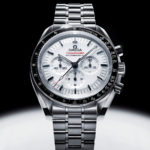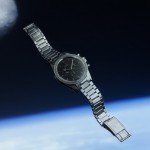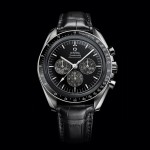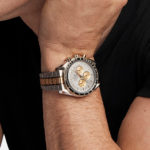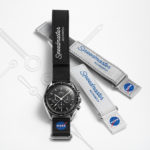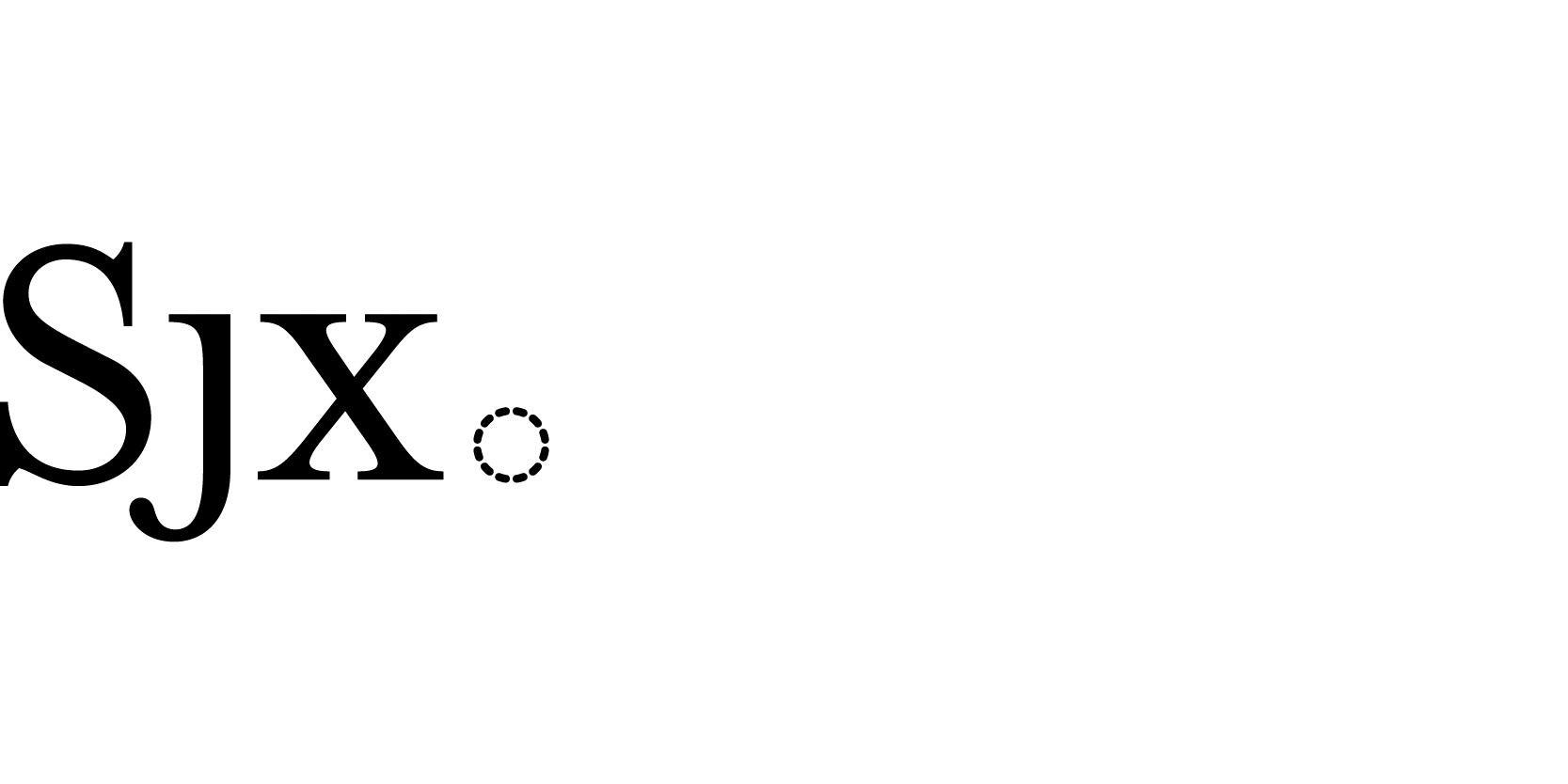In-Depth: Omega Speedmaster Moonwatch with White Lacquer Dial
A famous tool watch with a refined dial.
In late 2023, a then-unknown Moonwatch with a white dial was seen on the wrist of actor Daniel Craig. The mysterious watch turned out to be the Omega Speedmaster Moonwatch with a “lacquered white dial” that was officially unveiled in March 2024. Notably, it was released a regular production, instead of limited edition.
An iconic design, the Omega Speedmaster Professional is best known as the Moonwatch with the classic black dial. The model’s relative ubiquity – the Speedmaster has been in production for nearly seven decades – makes dial variants compelling (but also numerous, often as limited editions) as a refreshing alternative to the quintessential black dial.

Initial Impressions
The subject of significant attention on social media when it first emerged on Mr Craig’s wrist, the new Moonwatch is a surprising release that goes beyond a cosmetic tweak of dial colour.
It sports tangible differences to the dial furnishing that provide a sense of refinement over the regular black dial, namely the lacquered finishing and applied indices. And even though the dial is recognisably different, and arguably improved in terms of details, it retains the signature elements of the classic Moonwatch, including the stepped construction.

Beyond that, the rest of the watch is identical to the standard Moonwatch with black dial, which isn’t a bad thing because the “standard” model is now in its latest generation. The classic Moonwatch was revamped in 2021 with subtle yet perceptible upgrades, especially to the manual-wind movement that’s now the cal. 3861 Master Co-Axial Chronometer.
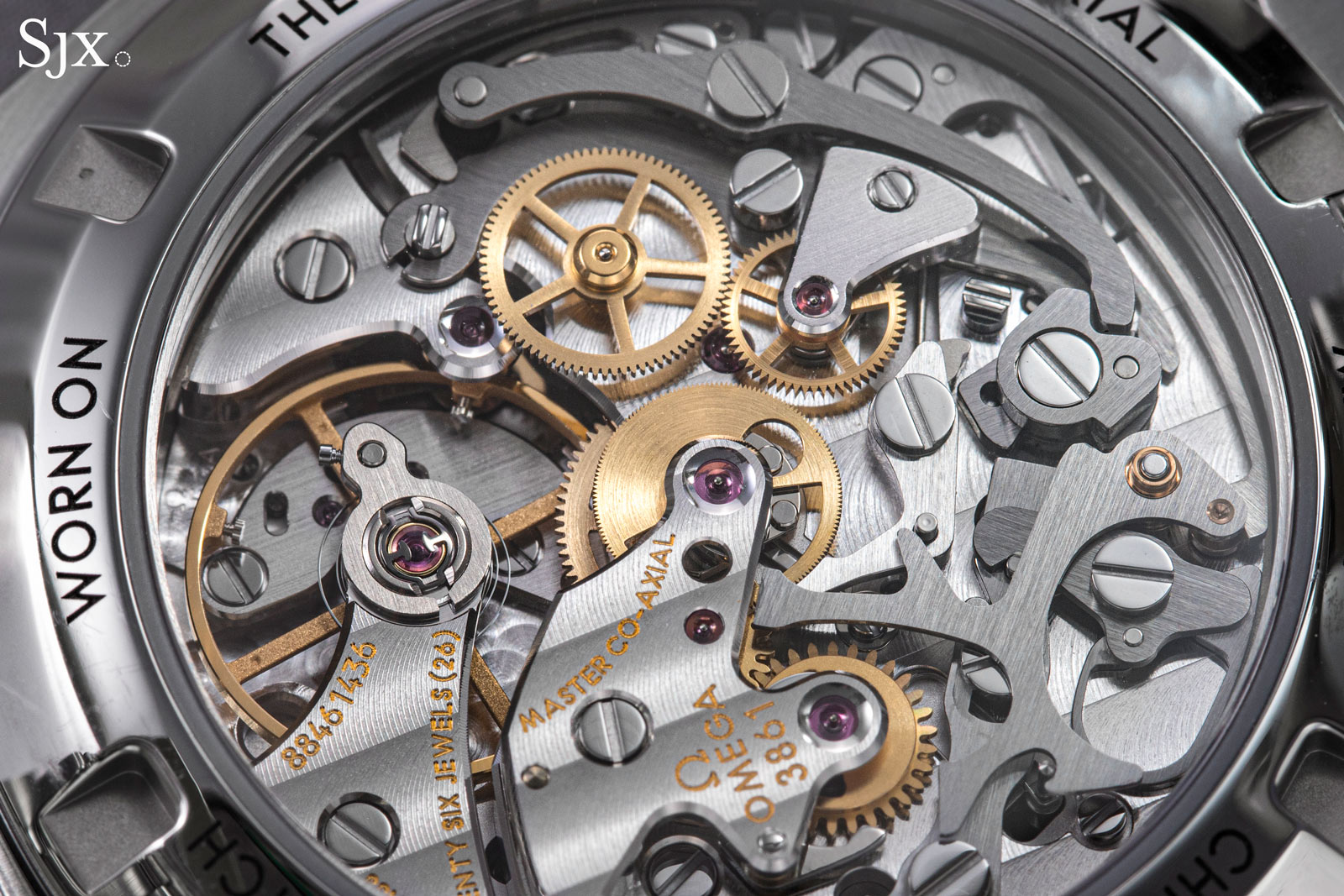
Previous Moonwatch models with a white dial were either in precious metals (such as the Canopus gold model), or special editions such as the Apollo 13 Silver Snoopy Award. Thus, it is a pleasant surprise is that this is not a limited edition. While the watch enjoyed unusually high demand upon release, availability has increased over time as it is a regular production model, making it an accessible yet special version of the Speedmaster Moonwatch.
At US$8100 on a bracelet, the white-dial Moonwatch is priced at US$100 above the regular model, making it a strongly attractive choice over the base model.

Refined details
The white dial deserves a closer look, as it is not merely a palette change.
The classic Moonwatch has a black dial with a slightly granular texture that is generally camouflaged by the dark colour. The black dial usually appears to be a clean, matte black, with the granular surface only noticeable under strong light. Though the black dial of the Moonwatch has evolved substantially over the decades, the matte black surface has largely the same, at least when examined at arm’s length.

The Moonwatch with a black dial finished with a slightly granular dial texture
In contrast, the white dial has a noticeably smooth, glassy surface that gives it a higher level of aesthetic refinement. This is especially evident around the edges of the recessed sub-dials, which have sharply-defined edges that resemble a multi-part construction, despite the dial being a single part.

The polished lacquer dial has a crisp precision, especially along the edges of the polished surfaces
My favourite aesthetic detail is “Speedmaster” printed in red, which generates contrast and complements the red-tipped seconds hand. At the same time, the line of red text differentiates this from past Speedmaster limited editions with white dials.
The red embellishment breaks the monotony of the otherwise monochromatic dial and further sets the white dial apart from other Speedmaster variants, which are usually furnished in black and white.

Four lines on the dial: a sans-serif “Omega”, “Speedmaster” in red italics, and a serif “Professional”, topped by an applied Omega logo
Upon closer inspection, the white lacquer surface has a subtle translucency. This is noticeable around the hashmarks on the sub-dials, which appear to “float”, casting a faint shadow.
This translucency results in a nuanced milky-white appearance, rather than a flat, opaque white, because of the reflection of light off the polished lacquer surface.

Notice the subtle shadows underneath the scales on the sub-dials, giving the illusion of “floating” print
Of surprising interest are the sub-dials, which have a cleanly stamped concentric pattern, also known as azurage. The quality of the dial is illustrates by the printing on the registers: the sub-dial scales are printed on top of the azurage, with the print conforming to the visually tactile grooves yet still maintaining clean edges without any bleed.

The azurage breaks the harsh reflection of light of the surrounding polished dial, creating a muted apperance that improves sub-dial legibility
Concentric stamping is used to create a “shimmer” effect on metallic dials, as at least one ring of grooves will reflect light regardless of the angle. For the Speedmaster, however, the azurage instead creates a diffused, almost-matte finish that contrast the glossy dial surface.
While the azurage is also found in on the black dial, the effect differs due to the granular finish of the coating. The concentric pattern on the white dial is crisp and clean, complementing the sharply-defined dial edges and surfaces.

Appliqués and steps
The refined finish extends to the applied hour indices, which are black-coated, versus the printed luminous markers found on the black dial.
The applied indices retain the traditional oblong design. Each baton has sharp edges without bevelling, but has a slight taper so that the baton slopes downwards towards the periphery of the dial, echoing the shape of the dial. The base of each baton has a tiny cutout to accommodate the stepped chapter ring of the dial.
Finally, a slot is machined near the tip of each baton to hold a small square of Super-Luminova. Lume is also applied to the two pips on either side of the 12 o’clock marker as an indicator of the dial orientation in the dark.

Because of the tiny amount of lume on the indices, the nighttime glow is not as ostentatious as that on the black dial Speedmaster where the entire length of the hour indices glow in the dark. But the contrast between the polished white dial and black indices provide decent legibility in regular or low light situations, and there’s enough lume on the hands to tell the time in the dark.

Like most historical Speedmaster models, this has a stepped dial. Interestingly, the stepped dial means the applied indices do not increase the overall height of the dial and hands compared to the black dial with flat, printed markers.
The sloped step of the chapter ring lowers the applied markers enough that sufficient clearance exists over the indices for the hands to travel unimpeded.
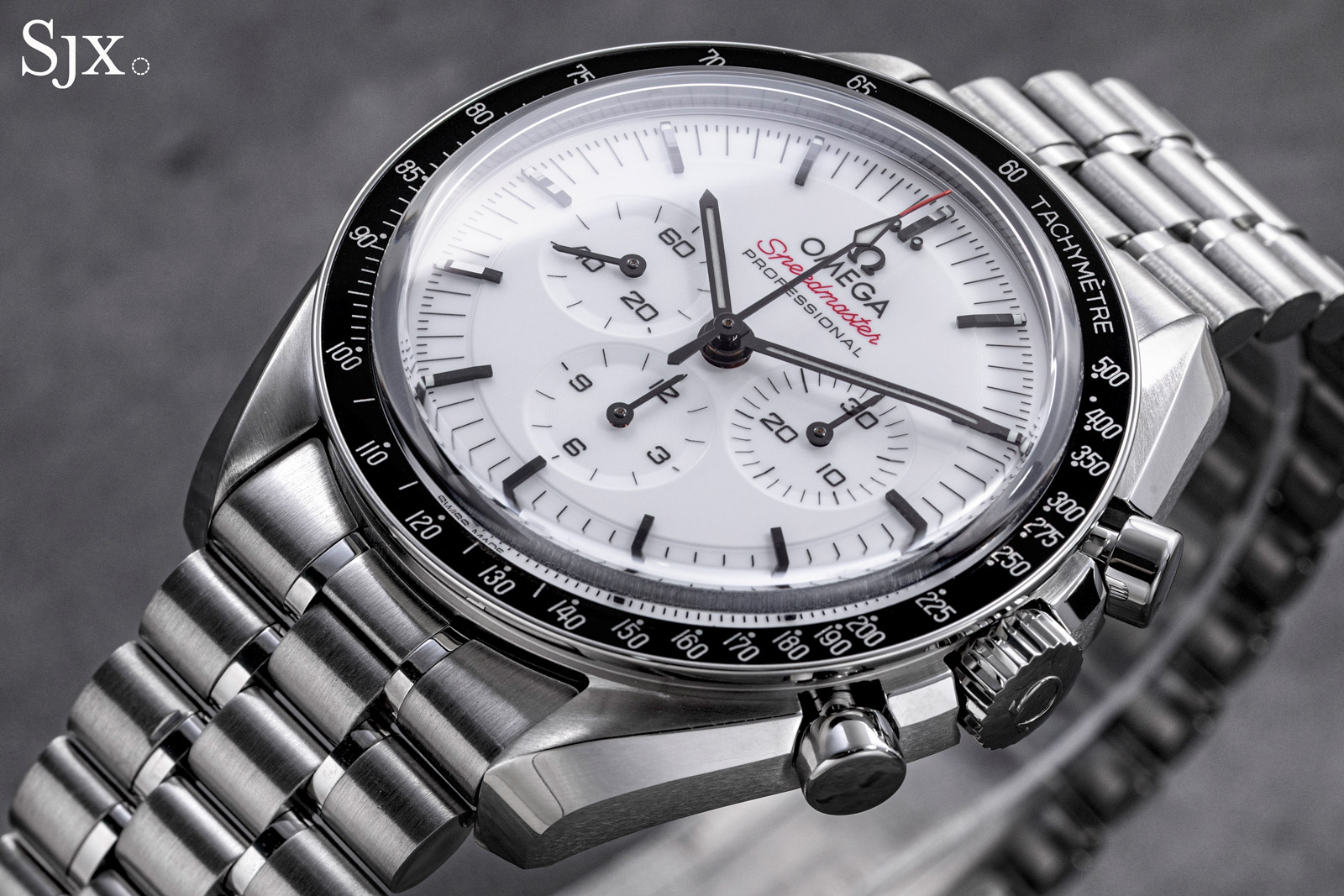
The stepped dial is most visible from the side
The applied indices on a stepped dial, however, results in an optical illusion, and a potential criticism.
Because the indices extend right up to the periphery of the dial, the base of each baton creates the impression of an angled point, which leaves the chapter ring appearing to be a dodecagon, instead of a perfectly round circle. Though it is not doubt unintentional, this brings to mind the “pie pan” dials found in mid-20th century Omega Constellation models.
The “pie pan” effect isn’t limited to the white dial, and is also found in other Speedmaster models with light-coloured dials such as the “Silver Snoopy Award” 50th Anniversary. I would’ve preferred slightly shorter indices that stop before the seconds scale on the periphery, as found in the Apollo 13 Silver Snoopy, though I concede that the long indices found here are a historically correct reference to the original Moonwatch.
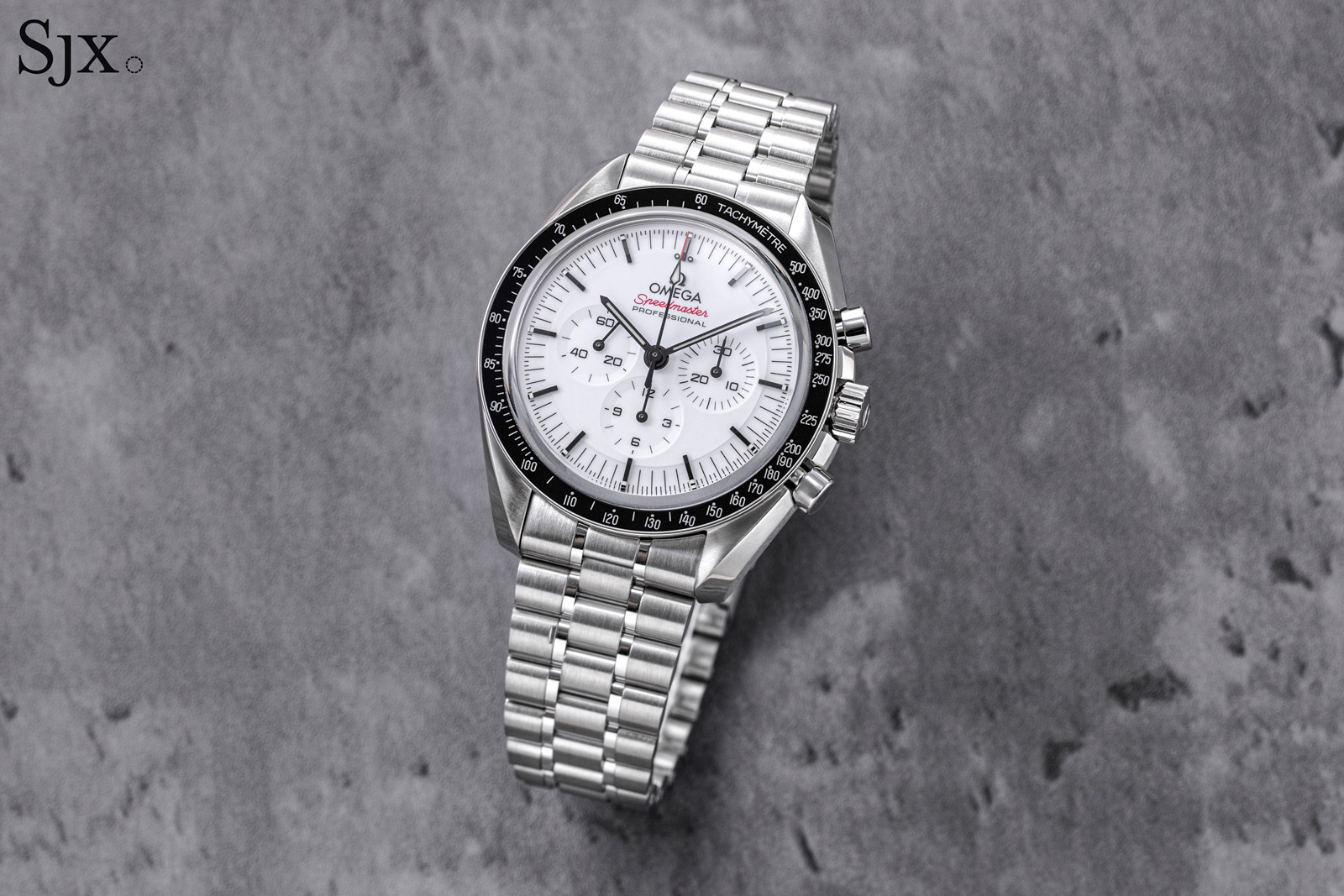
Classic Speedy specs
The rest of the new Moonwatch is identical to the tried-and-true classic model. The iconic steel case has a pleasing combination of brushed and polished finishing, and wears smaller than its dimensions of 42 mm wide and 13.2 mm thick as it sits low on the wrist.
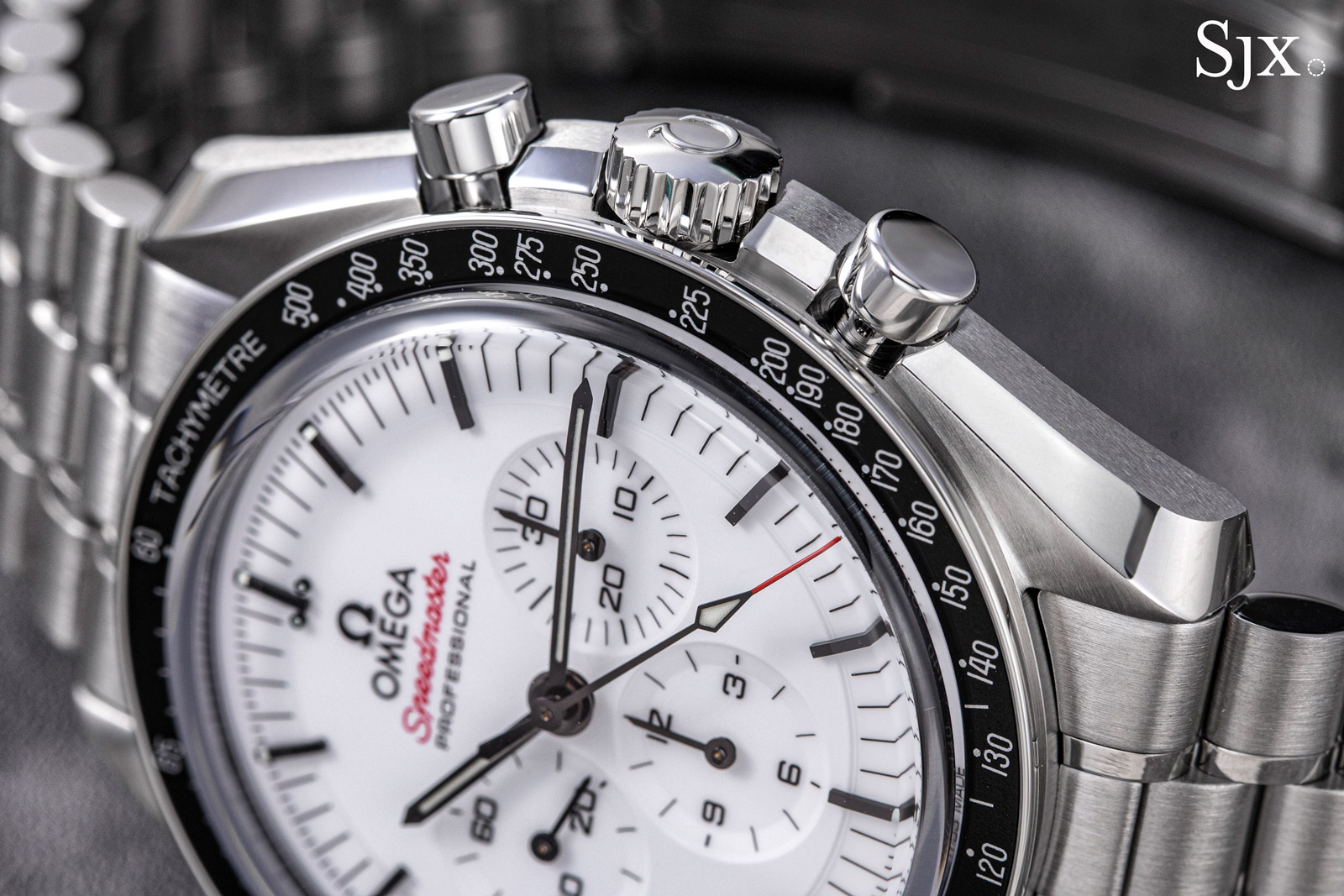
This has the same “dot over 90” bezel insert of black aluminium found on the standard model, but here it has greater contrast against the white dial and looks more prominent.

The historically-inspired “dot over 90” tachymeter bezel that’s standard for the Moonwatch with the cal. 3861
Notably, the white dial is only available with a sapphire crystal, unlike the standard model that can be had with a Hesalite crystal (making it less expensive).
While some may prefer Hesalite for aesthetics, historical accuracy, and cost, I feel the white dial is novel enough that taking some liberty with historicity is fine. The dial itself pairs well with the modern look of the boxed-shaped sapphire crystal.
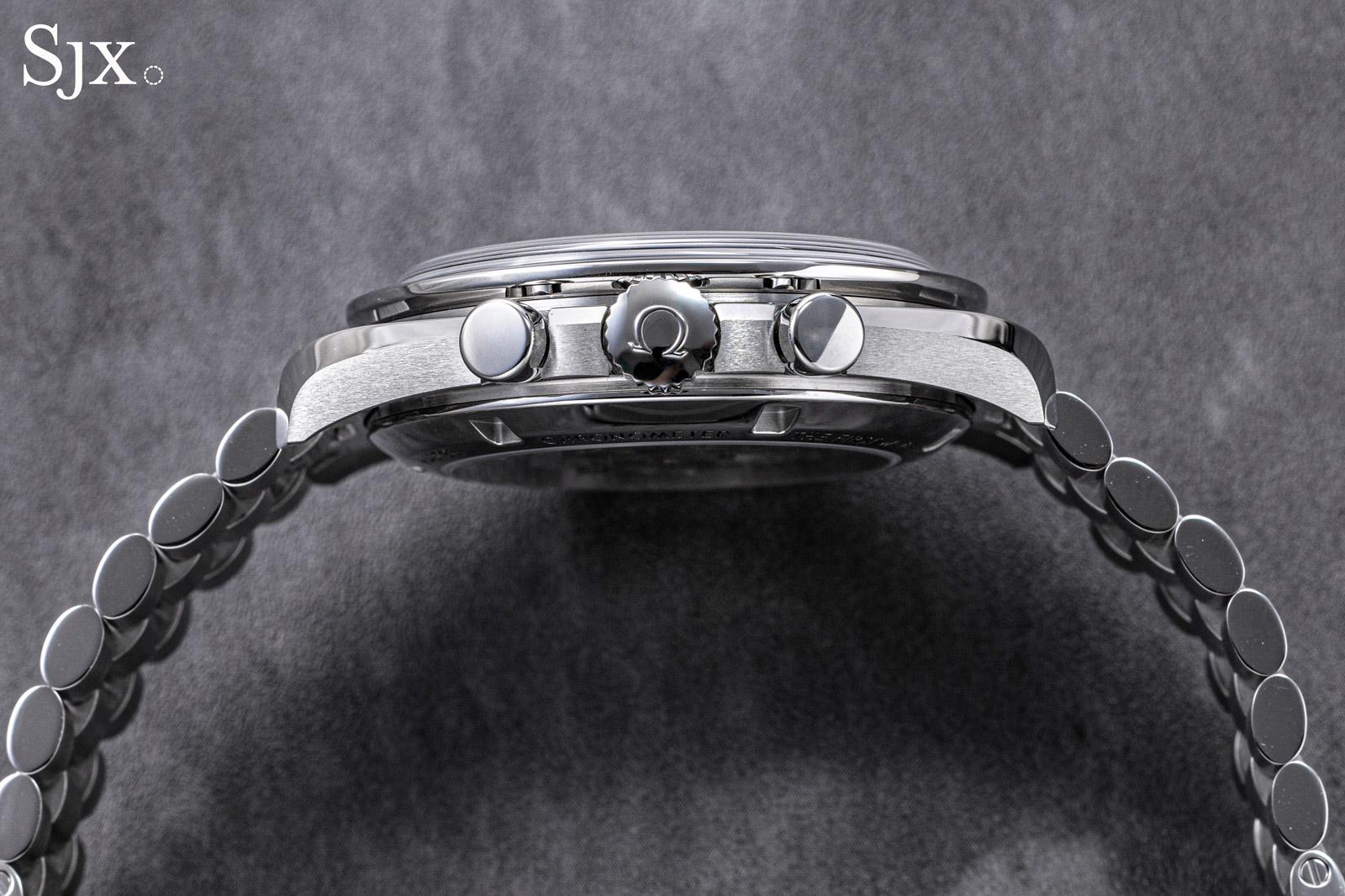
Part of the case thickness stems from the domed sapphire crystal, but the case is fairly slim and sits close to the wrist, allowing it to wear comfortably without feeling top heavy
Like the standard model, the Speedmaster with a white dial is offered with either a steel bracelet, “racing” strap in perforated leather, or an integrated rubber strap.
My personal is the black rubber strap for its clean, simple appearance that complements the white dial, while also providing a more sporty look.
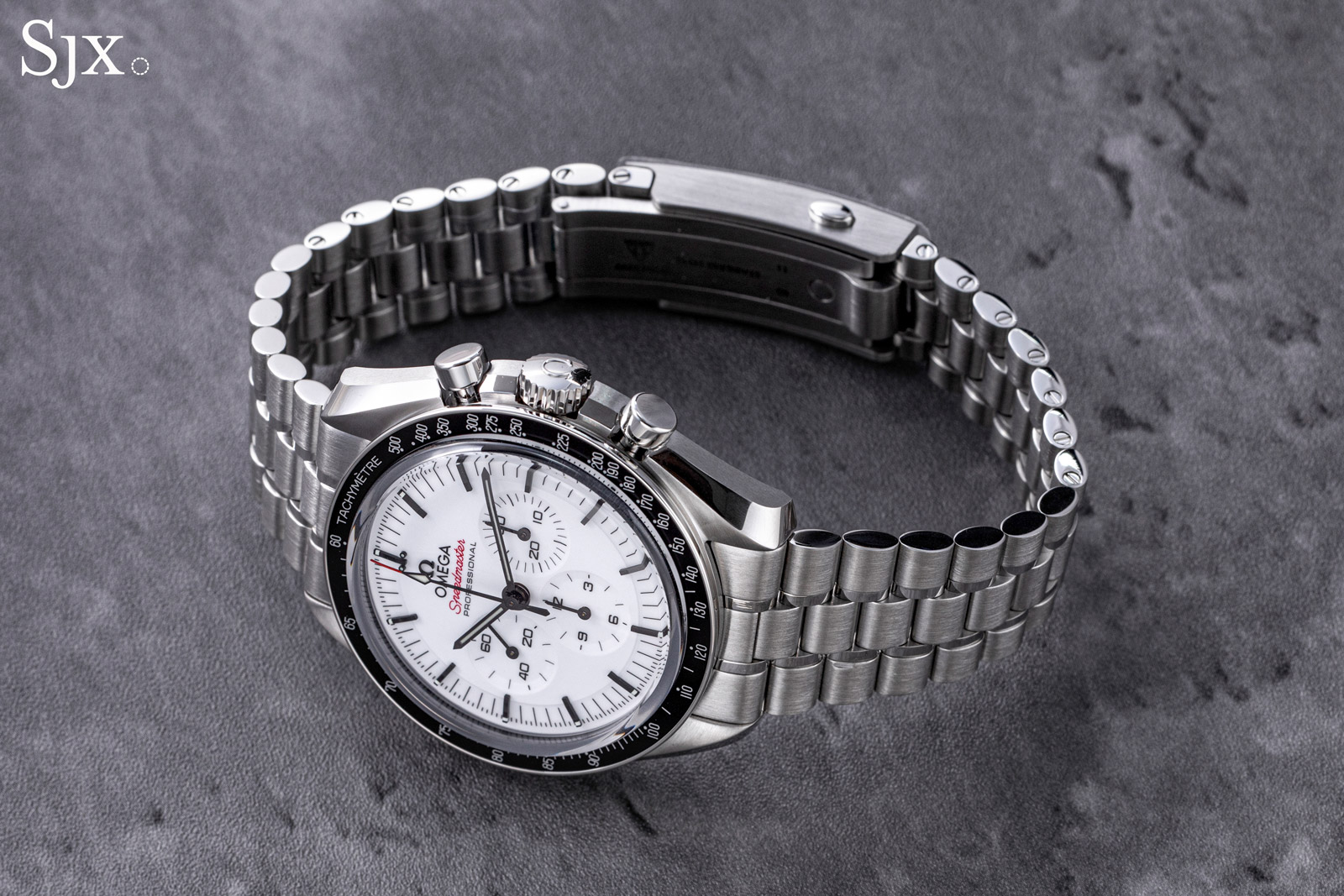
The bracelet has a hefty clasp with a micro adjustment function
Mechanics
Similarly, the movement is identical to that found in the standard version since 2021. The cal. 3861 is a revamped take on the manually-wound chronograph movement that has powered the Moonwatch for decades.
Originally the Lemania 1873, the calibre evolved into the Omega cal. 1861/1863. The cal. 3861 is the first substantive upgrade to the calibre that truly brings it into the 21st century. (For a deep dive into the cal. 3861, the inquisitive may refer to our detailed review.)
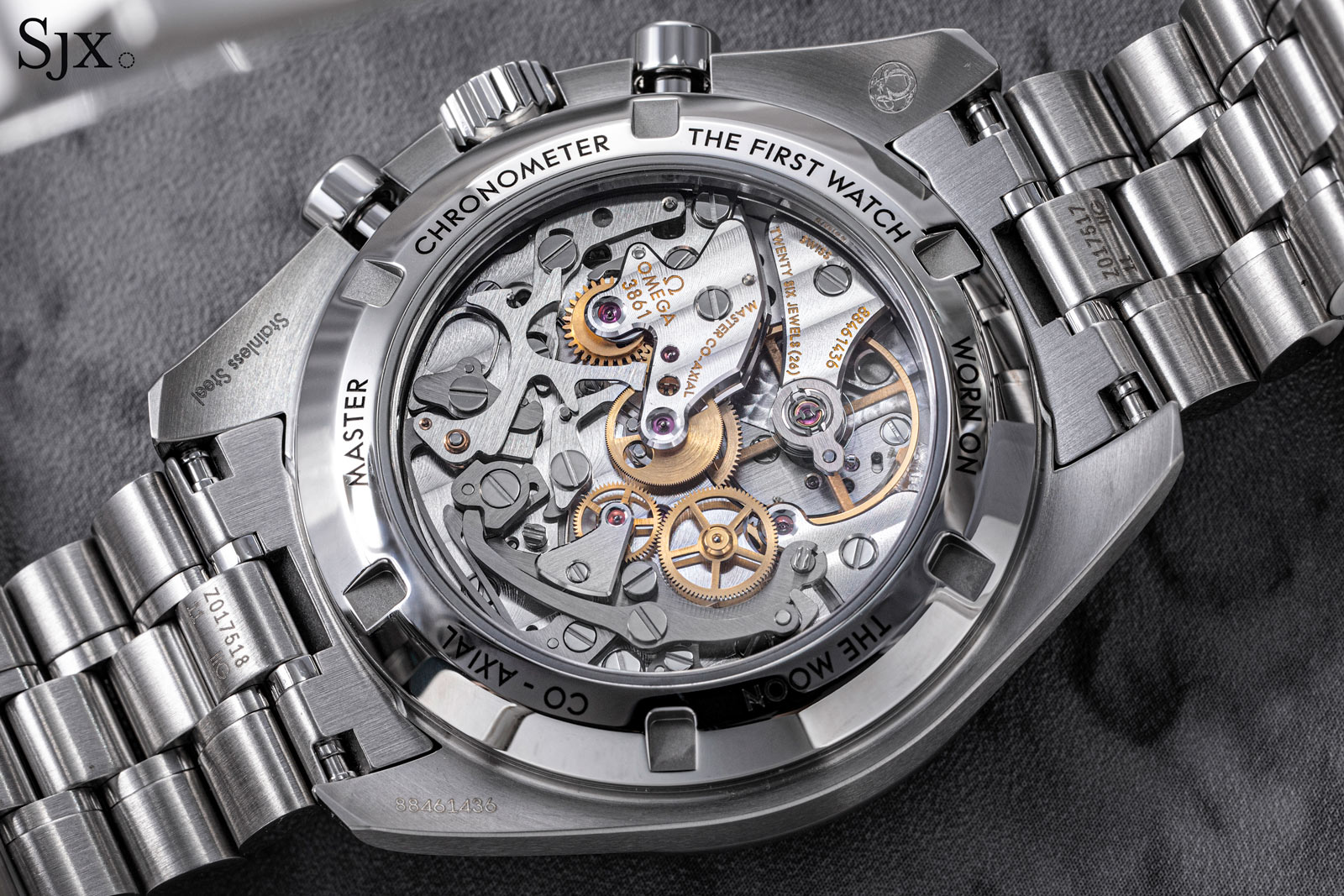
The most notable upgrade is the addition of the Co-Axial escapement invented by George Daniels and widely used across Omega movements today. Additionally, the cal. 3861 gains a hacking seconds – a huge convenience for setting the time to the second.
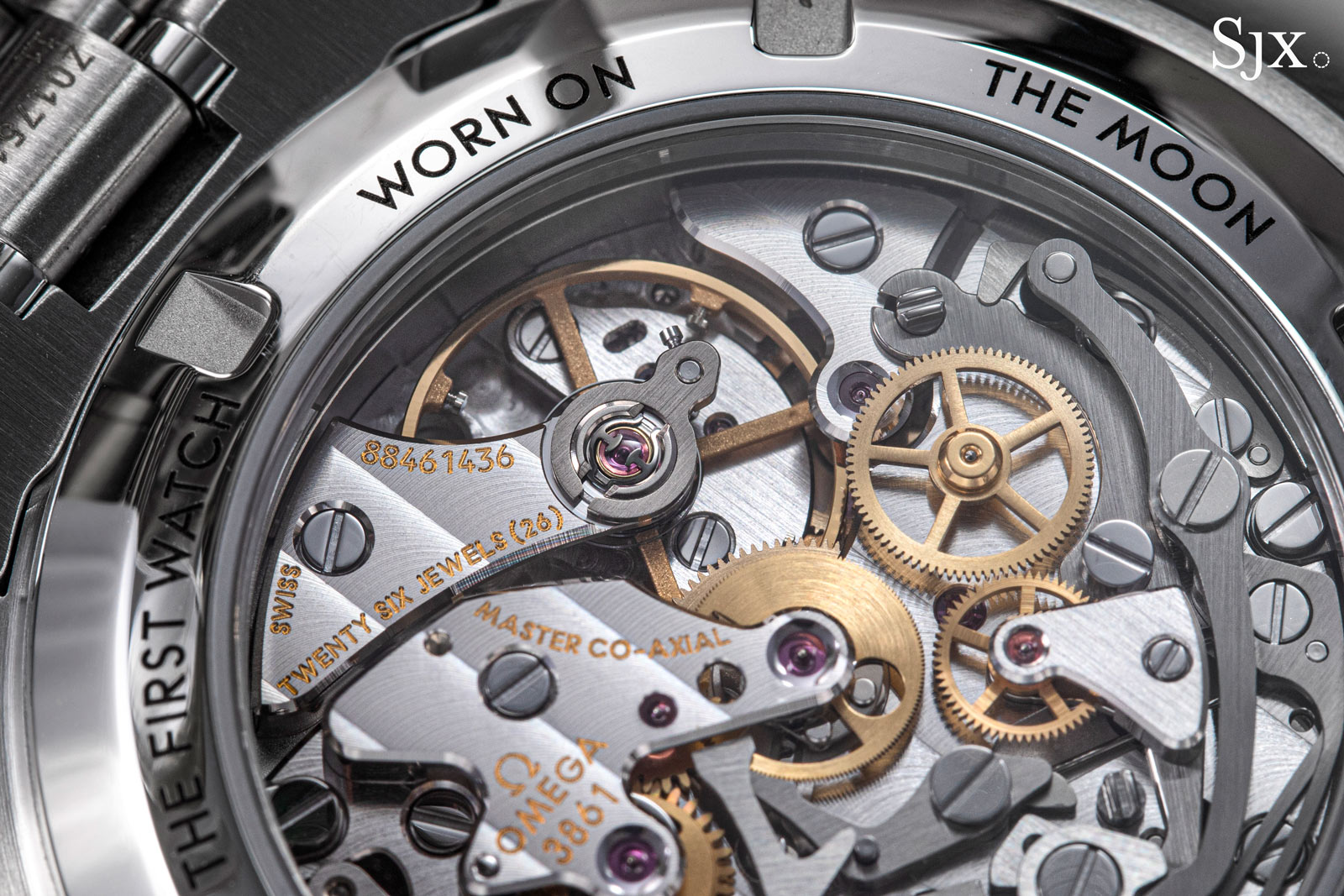
The freesprung balance and silicon hairspring, along with a Co-Axial escapement
Last but not least, the cal. 3861 has enhanced aesthetic appeal thanks to sharper and more precise finishing, most notably with diamond-cut bevels. As far as machine-finished movements go, the cal. 3861 stands out as one of the more appealing. In short, the cal. 3861 is a welcome improvement over its Lemania ancestor.
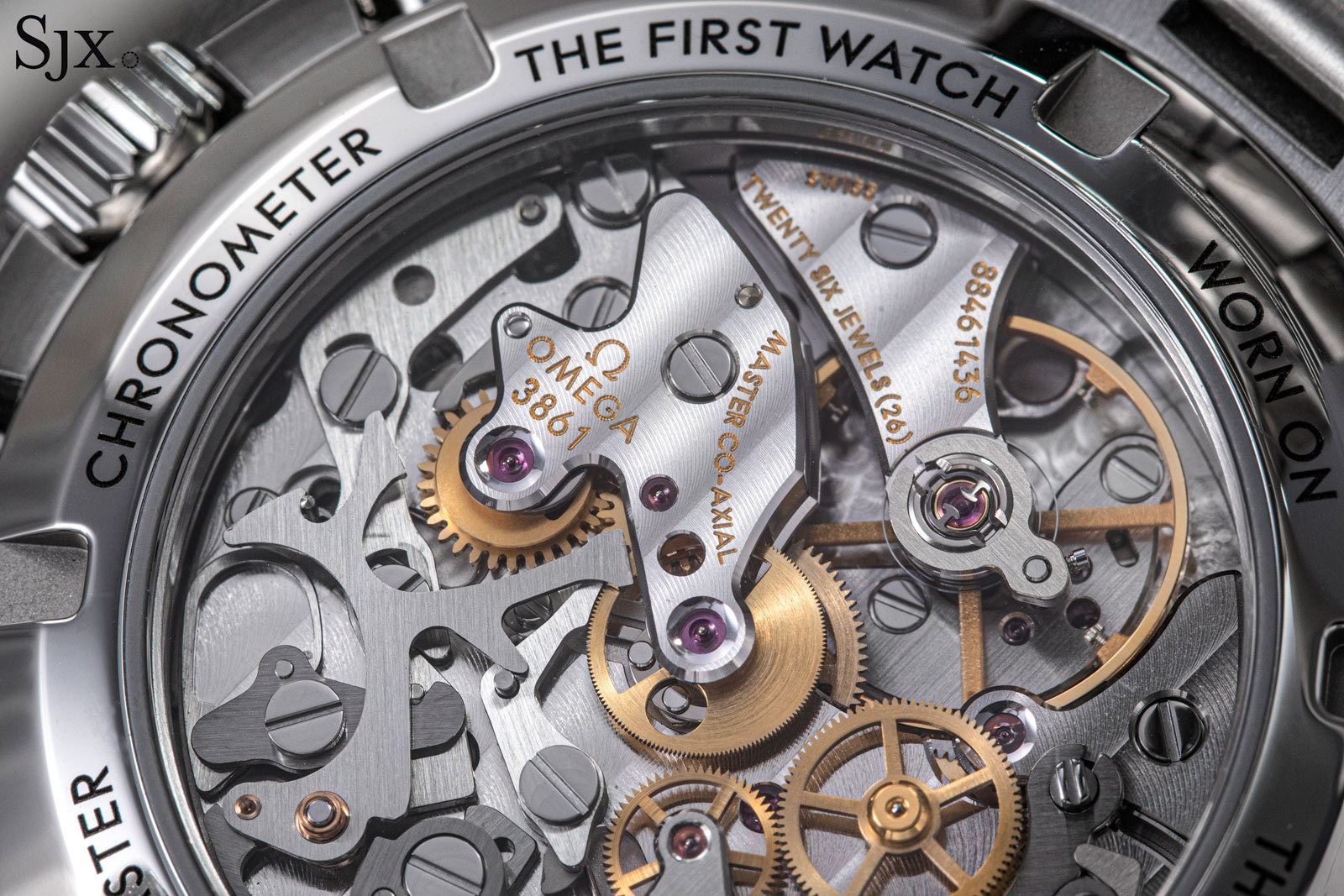
The bridge bevels are distinctively sharp, machined with a diamond-tipped drill bit

The lateral clutch of the chronograph with brushed steel levers
Concluding thoughts
Leaving aside the Moonwatch heritage, the latest Speedmaster is intrinsically attractive. The polished white dial, applied indices, and red accents are a striking combination, but the watch is still greater than the sum of its parts. It is enticing addition, even for someone who already owns the classic Moonwatch with a black dial.
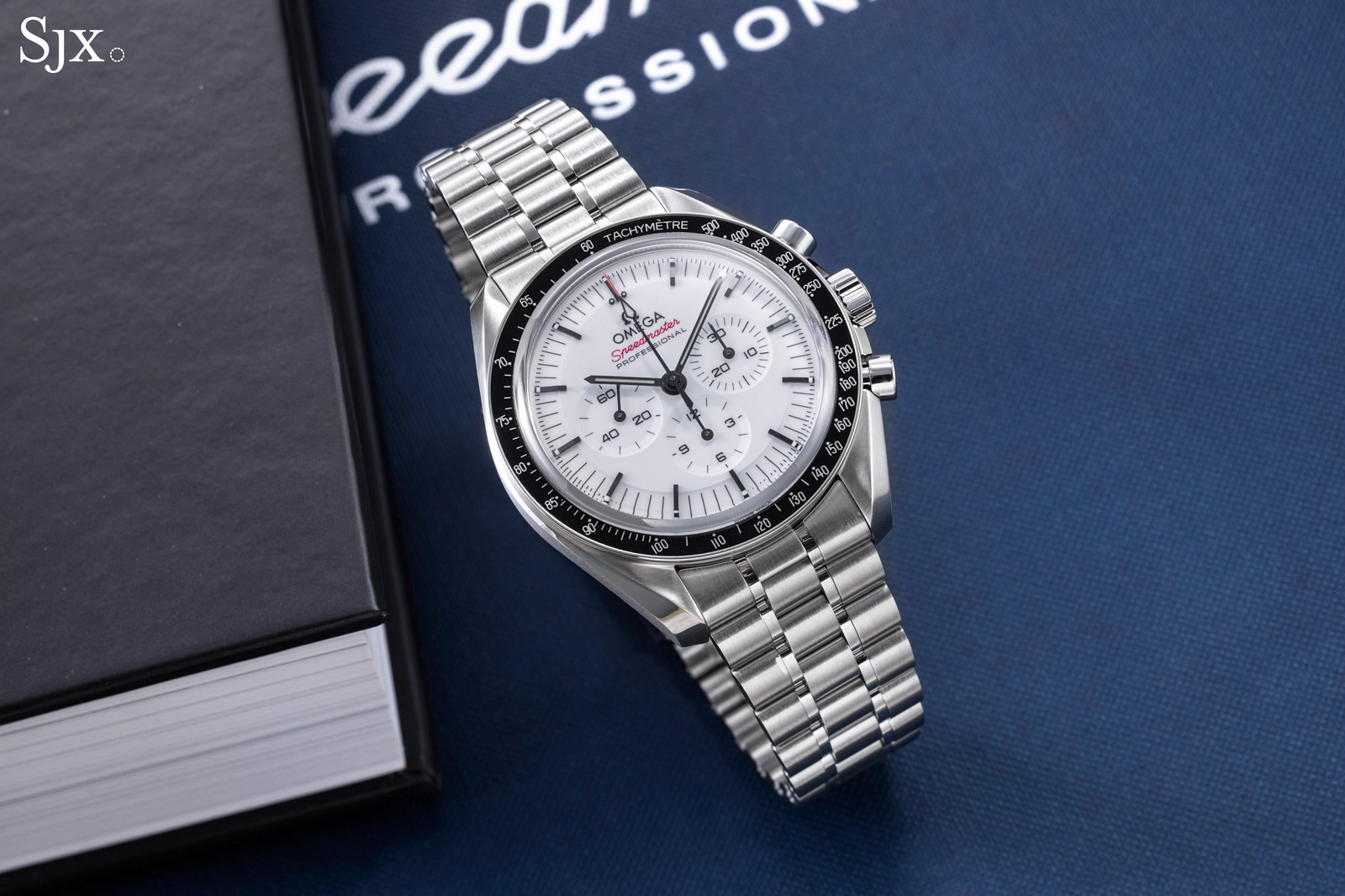
Key facts and price
Omega Speedmaster Moonwatch Lacquered White Dial
Ref. 310.30.42.50.04.001 (bracelet)
Ref. 310.32.42.50.04.002 (“racing” strap)
Ref. 310.32.42.50.04.001 (rubber strap)
Diameter: 42 mm
Height: 13.2 mm
Material: Steel
Crystal: Sapphire
Water resistance: 50 m
Movement: Cal. 3861
Functions: Hours, minutes, seconds, chronograph
Winding: Manual
Frequency: 21,600 beats per hour (3 Hz)
Power reserve: 50 hours
Strap: Steel bracelet or strap
Limited edition: No
Availability: At Omega boutiques initially then also at authorised retailers
Price: US$8,100 on bracelet
For more, visit Omegawatches.com.
Back to top.

